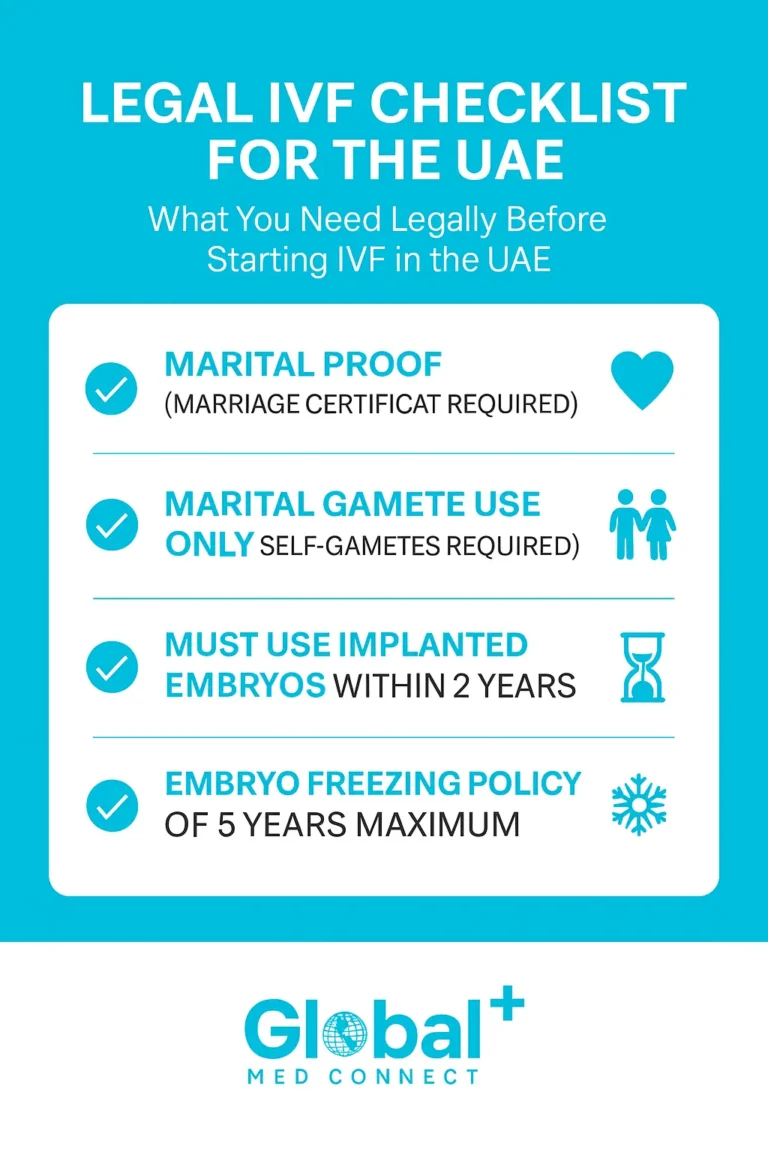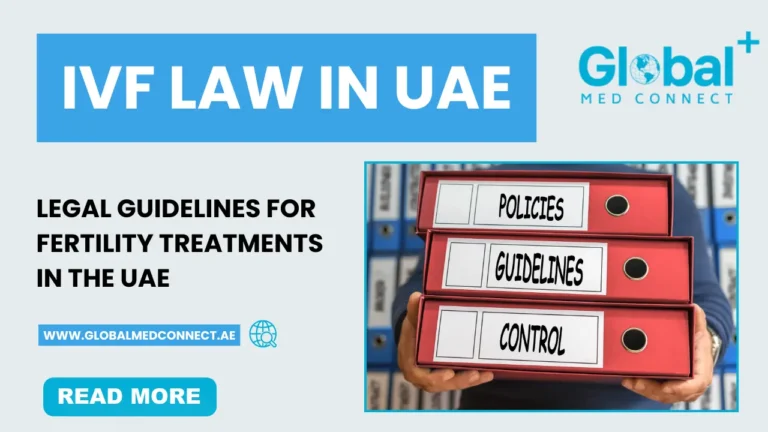The IVF law in the UAE has evolved dramatically in recent years, reflecting the nation’s commitment to inclusive, ethical, and advanced healthcare standards. For individuals and couples seeking fertility treatment in the Emirates, understanding the legal landscape is not just important, it’s essential.
Whether you’re a local resident, an expatriate, or a medical tourist exploring IVF in the UAE, knowing what’s legally allowed, restricted, and newly reformed can help you make informed decisions on your fertility journey.
In this blog, we break down the legal aspects of IVF in the UAE, from embryo freezing and marital requirements to donor rules and gender selection. If you’re planning to undergo IVF in Dubai or Abu Dhabi, this is your complete legal checklist.
IVF Law UAE: A Quick Overview of the Legal Framework
The UAE’s IVF laws are governed by Federal Law No. 7 of 2019, which has undergone progressive reforms to accommodate the country’s multicultural population. Most recently, Article 8 of the new ruling, published in the UAE’s Official Gazette, introduced significant updates:
Key Legal Highlights:
Non-Muslim unmarried couples can now legally undergo IVF treatments.
Embryo preservation is allowed for up to 5 years, giving couples flexibility in family planning.
Egg freezing is legal, empowering women to take charge of their fertility timelines.
Use of external sperm or egg donors is prohibited.
Gender selection for family balancing is permitted.
Preimplantation Genetic Testing (PGT) for hereditary diseases is allowed.
Muslim couples must provide proof of marriage to access IVF.
These reforms align with the UAE’s goal of maintaining ethical medical practices while embracing international standards.
Who Is Eligible for IVF in the UAE?
Understanding eligibility under IVF law in UAE is critical before starting treatment.
For Non-Muslim Couples:
No marriage proof is required for IVF procedures.
Same laws apply to residents and medical tourists.
Gender selection and embryo freezing are permitted.
For Muslim Couples:
Must submit legal proof of marriage to access IVF.
IVF treatments must adhere to Sharia-compliant guidelines.
Use of donor material is strictly forbidden.
These eligibility criteria highlight the UAE’s balance between cultural respect and global inclusivity.
What’s Legally Allowed in Fertility Clinics in Dubai & UAE?
Under the revised IVF law in the UAE, fertility clinics are legally allowed to offer several advanced reproductive techniques. This includes:
Legal Fertility Services in UAE:
ICSI & IVF Procedures
Egg and Embryo Freezing
Gender Selection (Family Balancing)
Chromosomal Normalcy Testing (PGT-A & PGT-M)
Frozen Embryo Transfer (FET)
Hormonal and Fertility Evaluations
Dubai and Abu Dhabi have some of the most technologically advanced IVF centers, offering international-standard care under the umbrella of legal safety.
For a complete medical and procedural guide, explore IVF in UAE – A Complete Guide.
What Is Not Allowed Under IVF Law in UAE?
While the UAE has embraced many modern fertility treatments, there are certain boundaries enforced by law:
Prohibited Under IVF Law UAE:
Sperm or Egg Donation from external parties
Surrogacy (not legally recognized in UAE)
Fertility treatments involving unregistered clinics
Embryo preservation beyond 5 years
The UAE places strong emphasis on family integrity and biological lineage, ensuring treatments are conducted within ethically approved frameworks.
Why Is IVF Law UAE a Game Changer for Global Patients?
Many international couples are now choosing UAE as an IVF destination, not just for the medical expertise, but also for its legal clarity.
Reasons Why Patients Choose UAE for IVF:
Legal acceptance of family balancing (gender selection) – only available in the UAE and USA.
Assurance of ethical practice through government oversight.
Culturally sensitive yet globally inclusive laws.
Embryo freezing and genetic testing permitted by law.
Availability of IVF to unmarried non-Muslim couples, setting a benchmark in the Middle East.
These factors make IVF law in UAE a pioneering framework in the region.
If you’re interested in accessing ethical and legal IVF services in the UAE, consider Global Med Connect’s IVF Treatment Services, where experienced professionals guide you through the process step-by-step.
How the Law Compares Globally
When comparing fertility laws around the world, the UAE stands out for balancing cultural values with medical progress. While countries like Germany, France, and India have strict restrictions on gender selection and embryo preservation, the UAE offers:
Family balancing (gender selection) with legal backing.
Genetic testing as part of legal protocol.
Transparency and legal protection for both local and international patients.
According to the World Health Organization (WHO), reproductive autonomy is critical to population health. The UAE’s legal reforms align with this global vision. Read more on WHO’s stance on reproductive rights.
Summary: Legal Must-Knows Before Starting IVF in UAE
Here’s a quick recap to help you stay informed and compliant:
Legal Checklist for IVF in UAE:

Verify marital status as per your religion.
Confirm legality of embryo preservation (max 5 years).
Ensure your chosen clinic is DHA/MOHAP registered.
No donor sperm/egg – only self gametes allowed.
Gender selection allowed under “Family Balancing”.
PGT testing is legal for chromosomal health checks.
You can learn more about the entire IVF procedure in the UAE, covering costs, steps, and success rates.
Planning IVF in UAE? Let Global Med Connect Be Your Legal & Medical Partner
Navigating the legal aspects of IVF in UAE can be overwhelming without expert help. That’s why Global Med Connect offers end-to-end guidance—from clinic selection and documentation to visa processing and ethical compliance.
Our IVF services in the UAE are tailored for both residents and international couples, ensuring complete support across your fertility journey.
Final Thoughts: IVF Law UAE
The IVF law in the UAE is not only progressive but also uniquely positioned to serve a global community with transparency, ethical standards, and medical excellence. Understanding these legal nuances is your first step towards a successful fertility journey.
Let Global Med Connect be your trusted partner in navigating the path ahead, safely, legally, and successfully.
FAQs: IVF Law in UAE
Yes, under the updated IVF law in UAE, non-Muslim unmarried couples are now legally allowed to undergo IVF treatments. This progressive change reflects the UAE’s inclusive approach to healthcare and reproductive rights, especially for expats and international patients.
Absolutely. Muslim couples can legally undergo IVF in the UAE, provided they submit proof of marriage, as required by law. The treatment must also comply with Shariah principles, which prohibit the use of donor sperm or eggs.
Yes, the UAE allows embryo freezing for up to 5 years, as per the latest legal reforms. This gives couples flexibility in planning their family and preserving fertility for medical or personal reasons.
No. The use of donor sperm or donor eggs is strictly prohibited under the current IVF law in UAE. All fertility treatments must involve gametes (eggs and sperm) from the legally married couple only.
Yes, gender selection is legally permitted in the UAE for family balancing purposes. This makes the country one of the few in the world, alongside the USA, where patients can legally choose the gender of their baby during IVF.
No, you do not need to be a resident. Medical tourists from around the world can undergo IVF in the UAE, provided they follow the local legal and documentation requirements under IVF law. Non-Muslim couples face fewer restrictions compared to Muslim couples.
The documentation requirements vary based on religion and marital status:
Muslim couples: Valid marriage certificate required.
Non-Muslim couples: Passport copies and identification.
All documents must comply with UAE law to proceed with treatment.
Yes, the revised IVF law in UAE allows egg freezing for single women, giving them the freedom to preserve their fertility for future use. This is a landmark shift in UAE’s reproductive healthcare policy.
Yes, only DHA, MOHAP, or HAAD-licensed fertility clinics are authorized to perform IVF treatments in the UAE. It is important to choose a legally certified clinic to ensure ethical compliance and legal safety.
Yes, many platforms like Global Med Connect provide legal and medical assistance to help international and local patients navigate IVF procedures in the UAE in full compliance with the law.
Contact us
Have Questions? We're Just a Click Away!
Call us to this number for immediate support
+971 56 757 0688
+44 7570569435





